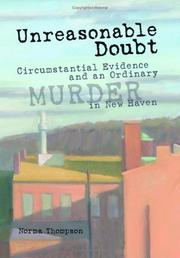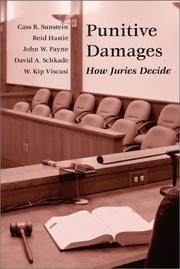| Listing 1 - 10 of 15 | << page >> |
Sort by
|
Book
ISBN: 0585262977 9780585262970 Year: 1991 Volume: 14 Publisher: Scottdale, Pa. Herald Press
Abstract | Keywords | Export | Availability | Bookmark
 Loading...
Loading...Choose an application
- Reference Manager
- EndNote
- RefWorks (Direct export to RefWorks)
Jury --- Judgments by peers --- Juries --- Trial by jury --- Trial by peers --- Trials --- Law and fact --- Lay judges --- Miscellanea. --- Religious aspects --- Christianity. --- Law and legislation
Book
ISBN: 0814704980 9780814725221 0814725228 9780814704981 9780814720189 0814720188 9780814720196 0814720196 Year: 2012 Publisher: New York, NY
Abstract | Keywords | Export | Availability | Bookmark
 Loading...
Loading...Choose an application
- Reference Manager
- EndNote
- RefWorks (Direct export to RefWorks)
While jury decision making has received considerable attention from social scientists, there have been few efforts to systematically pull together all the pieces of this research. In Jury Decision Making Dennis J. Devine examines over 50 years of research on juries and offers a “big picture” overview of the field. The volume summarizes existing theories of jury decision making and identifies what we have learned about jury behavior, including the effects of specific courtroom practices, the nature of the trial, the characteristics of the participants, and the evidence itself. Making use of those foundations, Devine offers a new integrated theory of jury decision making that addresses both individual jurors and juries as a whole and discusses its ramifications for the courts. Providing a unique combination of broad scope, extensive coverage of the empirical research conducted over the last half century, and theory advancement, this accessible and engaging volume offers "one-stop shopping" for scholars, students, legal professionals, and those who simply wish to better understand how well the jury system works.
Jury --- Judgments by peers --- Juries --- Trial by jury --- Trial by peers --- Trials --- Law and fact --- Lay judges --- Psychological aspects. --- Decision making. --- Law and legislation
Book
ISBN: 1593325118 9781593325114 1593324855 9781593324858 9781593324858 Year: 2012 Publisher: El Paso LFB Scholarly Pub.
Abstract | Keywords | Export | Availability | Bookmark
 Loading...
Loading...Choose an application
- Reference Manager
- EndNote
- RefWorks (Direct export to RefWorks)
Flexon presents an interdisciplinary perspective to the problem of racial disparities in capital case outcomes. In doing so, research from social and cognitive psychology concerning stereotypes and attitude influence were bridged with other empirical findings concerning racial disparities in capital sentencing. Specifically, the psychology of stereotypes and attitudes are used to help explain how racial discrimination can operate undetected among death qualified jurors while producing sentencing discrepancies. The introduction of a potential source of bias information concerning criminal justi
Discrimination in capital punishment --- Jury --- Judgments by peers --- Juries --- Trial by jury --- Trial by peers --- Trials --- Law and fact --- Lay judges --- Decision making. --- Law and legislation

ISBN: 0826265375 9780826265371 9780826216380 0826216382 Year: 2006 Publisher: Columbia, Mo. University of Missouri Press
Abstract | Keywords | Export | Availability | Bookmark
 Loading...
Loading...Choose an application
- Reference Manager
- EndNote
- RefWorks (Direct export to RefWorks)
"A murder trial ends in a hung jury because of the reasonable doubt of a few jurors who, faced with circumstantial evidence, refuse to judge the accused. Thompson confronts this evasion of judgment through the reexamination of the works of Faulkner, Austen, Tocqueville, Plato, and Aristotle"--Provided by publisher.
Trials (Murder) --- Jury --- Jury in literature. --- Judgments by peers --- Juries --- Trial by jury --- Trial by peers --- Trials --- Law and fact --- Lay judges --- Murder trials --- Murder --- History. --- Philosophy. --- Law and legislation --- Bazier, Anthony
Book
ISBN: 1317153073 1317153065 128224373X 9786612243738 0754698076 9780754698074 9780754674054 0754674053 9781315576428 9781317153054 9781317153061 9781138254312 1315576422 Year: 2009 Publisher: Farnham, England ; Burlington, VT : Ashgate,
Abstract | Keywords | Export | Availability | Bookmark
 Loading...
Loading...Choose an application
- Reference Manager
- EndNote
- RefWorks (Direct export to RefWorks)
Examining lay participation in the administration of justice and how it reflects certain democratic principles, Democracy in the Courts explores issues critical to confidence in criminal justice.
Criminal courts --- Lay judges --- Jury --- Judgments by peers --- Juries --- Trial by jury --- Trial by peers --- Trials --- Law and fact --- Courts, Criminal --- Correctional institutions --- Courts --- Criminal justice, Administration of --- Criminal procedure --- Law and legislation
Book
ISBN: 0821444298 9780821444290 0821419560 9780821419564 Year: 2012 Publisher: Athens, Ohio Ohio University Press
Abstract | Keywords | Export | Availability | Bookmark
 Loading...
Loading...Choose an application
- Reference Manager
- EndNote
- RefWorks (Direct export to RefWorks)
In the antebellum Midwest, Americans looked to the law, and specifically to the jury, to navigate the uncertain terrain of a rapidly changing society. During this formative era of American law, the jury served as the most visible connector between law and society. Through an analysis of the composition of grand and trial juries and an examination of their courtroom experiences, Stacy Pratt McDermott demonstrates how central the law was for people who lived in Abraham Lincoln's America. McDermott focuses on the status of the jury as a democratic institution as well as on the status of those
Justice, Administration of --- Jury --- Administration of justice --- Law --- Courts --- Judgments by peers --- Juries --- Trial by jury --- Trial by peers --- Trials --- Law and fact --- Lay judges --- History --- Law and legislation
Book
ISBN: 1108168744 1108163602 110817356X 1107194695 1108707092 9781108173568 9781108163606 9781107194694 Year: 2017 Publisher: United Kingdom
Abstract | Keywords | Export | Availability | Bookmark
 Loading...
Loading...Choose an application
- Reference Manager
- EndNote
- RefWorks (Direct export to RefWorks)
The delivery of justice is a core function of the modern state. The recent introduction of jury/lay judge systems for criminal trials in Japan, South Korea, Spain, and perhaps soon Taiwan represents a potentially major reform of this core function, shifting decision making authority from professional judges to ordinary citizens. But the four countries chose to empower their citizens to markedly different degrees. Why? Who Judges? is the first book to offer a systematic account for why different countries design their new jury/lay judge systems in very different ways. Drawing on detailed theoretical analysis, original case studies, and content analysis of fifty years of Japanese parliamentary debates, the book reveals that the relative power of 'new left'-oriented political parties explains the different magnitudes of reform in the four countries. Rieko Kage's vital new study opens up an exciting new area of research for comparative politics and socio-legal studies.
Jury --- Jury selection --- Justice, Administration of --- Jury. --- Justice, Administration of. --- Administration of justice --- Law --- Courts --- Judgments by peers --- Juries --- Trial by jury --- Trial by peers --- Trials --- Law and fact --- Lay judges --- Selection of jury --- Voir dire --- Law and legislation

ISBN: 1282537849 9786612537844 0226780163 9780226780160 9780226780146 0226780147 Year: 2002 Publisher: Chicago University of Chicago Press
Abstract | Keywords | Export | Availability | Bookmark
 Loading...
Loading...Choose an application
- Reference Manager
- EndNote
- RefWorks (Direct export to RefWorks)
Over the past two decades, the United States has seen a dramatic increase in the number and magnitude of punitive damages verdicts rendered by juries in civil trials. Probably the most extraordinary example is the July 2000 award of
Exemplary damages --- Jury --- Judgments by peers --- Juries --- Trial by jury --- Trial by peers --- Trials --- Law and fact --- Lay judges --- Decision making. --- Law and legislation --- United States --- punishment, united states, usa, america, american, college, university, textbook, verdict, civil, trial, judge, ury, judicial, lawsuit, class action, auto, bmw, manufacturer, manufacturing, automobile, controversy, environment, data, experiment, psychology, behavior, analysis, plaintiff, corporate, risk, corporation, juror, jury, assessment.
Book
ISBN: 146960440X 0807895776 9780807895771 9781469604404 0807833630 9780807833636 9780807833636 9798893132090 Year: 2010 Publisher: Chapel Hill, NC : University of North Carolina Press,
Abstract | Keywords | Export | Availability | Bookmark
 Loading...
Loading...Choose an application
- Reference Manager
- EndNote
- RefWorks (Direct export to RefWorks)
James Donovan takes a comprehensive approach to the history of the jury in modern France by investigating the legal, political, sociocultural, and intellectual aspects of jury trial from the Revolution through the twentieth century. He demonstrates that these juries, through their decisions, helped shape reform of the nation's criminal justice system.From their introduction in 1791 as an expression of the sovereignty of the people through the early 1900's, argues Donovan, juries often acted against the wishes of the political and judicial authorities, despite repeated governmental attempt
Criminal justice, Administration of --- Criminal procedure --- Jury --- Criminal law --- Courts --- Procedure (Law) --- Public law --- Appellate procedure --- Criminal courts --- Trial practice --- Judgments by peers --- Juries --- Trial by jury --- Trial by peers --- Trials --- Law and fact --- Lay judges --- History. --- Pleading and practice --- Law and legislation
Book
ISBN: 0773419039 9780773419032 9780773414181 0773414185 Year: 2010 Publisher: Lewiston, N.Y. Edwin Mellen Press
Abstract | Keywords | Export | Availability | Bookmark
 Loading...
Loading...Choose an application
- Reference Manager
- EndNote
- RefWorks (Direct export to RefWorks)
This book examines challenges to jury reforms in the transitional justice systems of the post-Soviet countries. It also provides an analysis of the historical, political and social contexts criminal justice reforms in the former Soviet Union. This book contains six color photographs and 1 black and white photographs.
Jury -- Former Soviet republics. --- Lay judges -- Former Soviet republics. --- Jury --- Lay judges --- Law - Non-U.S. --- Law, Politics & Government --- Law - Africa, Asia, Pacific & Antarctica --- Judges --- Judgments by peers --- Juries --- Trial by jury --- Trial by peers --- Trials --- Law and fact --- Law and legislation
| Listing 1 - 10 of 15 | << page >> |
Sort by
|

 Search
Search Feedback
Feedback About UniCat
About UniCat  Help
Help News
News